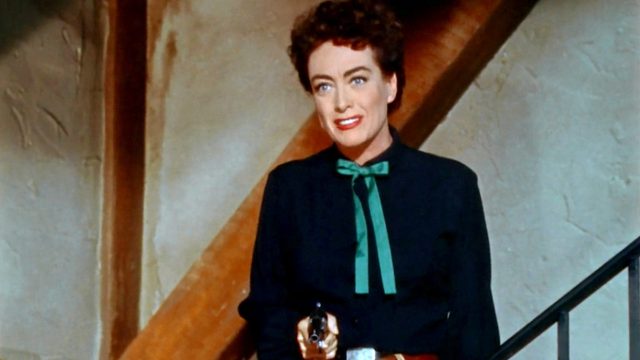I don’t know if it’s exposure to Mommie Dearest at an impressionable age, but I tend to think there’s just something sinister about Joan Crawford. I’ve seen no few movies where she’s not supposed to be, but there’s still an undercurrent there. Maybe it’s the lingering impression of her cutthroat determination to be a star; it’s hard to take her seriously as a lighthearted romantic interest when you know how seriously she took herself. And some of what her adopted daughter said in that book, which I’ve read, does linger, every bit as much as Faye Dunaway’s performance.
Perhaps the most astonishing thing about Joan Crawford is that she was named in a fan magazine contest. And that her birth name is the one that sounds more fake. Lucille LeSueur sounds, honestly, like the kind of name a teenager from the middle of nowhere would give herself to sound fancier than she was. Also, it was pointed out that her last name did sound like “sewer.” So after her first few appearances, a contest was held. The winning name was “Joan Arden,” but there was already a Joan Arden. So she became Joan Crawford—she never really liked the last name, and she wished she’d been Joann, but there we are.
I’m not sure people remember that she was in silent movies. She was four years older than her great rival, and she had less education and little previous career on the stage. Certainly not the kind of acting Davis had done; she started, hard as it might be to believe, as a chorus girl. Her first appearance in movies was in 1925, as Norma Shearer’s body double. F. Scott Fitzgerald thought she was the quintessential flapper. She won dance contests, in part to attract attention to herslef and further her career. She’s uncredited in some of the classics of the era, including Ben-Hur: A Story of the Christ.
She’s such a weird staple of ’20s culture, and it’s an aspect of her that people don’t tend to talk about. Possibly because we don’t talk much about ’20s culture in general; possibly because she wouldn’t adopt Christina until 1940. Possibly because her later career is so much more compelling in its utterly bonkers nature. But I mean, she married Douglas Fairbanks, Jr. (Apparently, Mary Pickford hated her.) She could Charleston well enough to win contests. She did any number of flapper pictures in her early years, and honestly, that’s easier to picture than Joan Crawford, Housewife, which I saw in a few of her ’40s movies.
She’s yet another woman, I think, who was damaged by the coming of the Code. People talk a lot about careers ended by the coming of sound, which Crawford weathered just fine. It’s more that she was better suited to playing a woman of a certain type—one frankly not too terribly unlike what I know of her as a person, though perhaps with more of a sense of humour than she seems to have had. I wonder if she might’ve gotten along better with Bette Davis if she’d had one.
I’m never going to have prize money from a dance contest to keep myself going; consider supporting my Patreon or Ko-fi!

